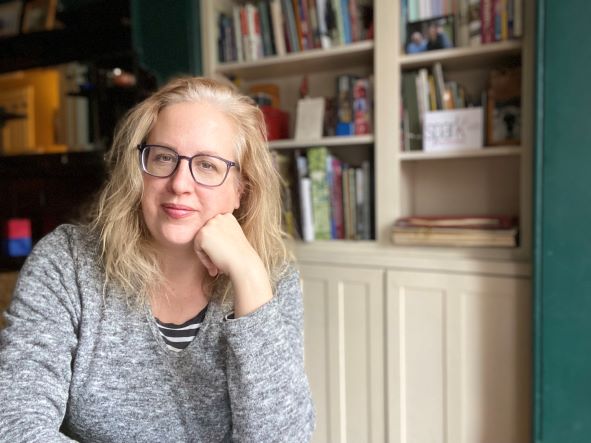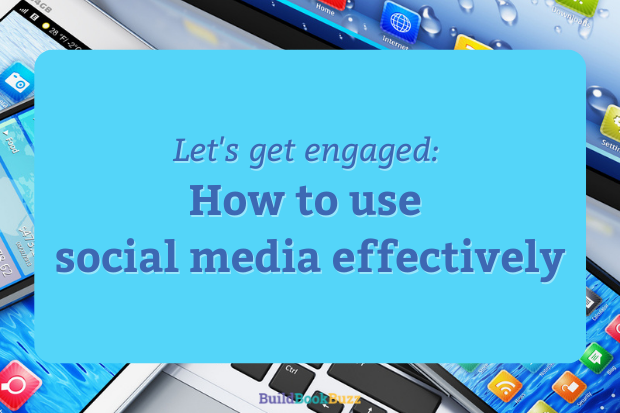Let’s get engaged: How to use social media effectively
A social media pro explains how authors can master social media so the time they spend on social networks yields results, not disappointment.
I was so impressed with Amy Rogers Nazarov when we were on a DIY book marketing conference panel together last month that I asked her to write a “how to master social media” guest post for us. Amy is a former journalist who teaches people how to use social media more effectively, with less scrolling and more serendipity. Before she launched Spark: Social Media Strategy in 2014, she was both a freelance and staff writer. Her byline has appeared in Cooking Light, Slate, The Washington Post, and American Songwriter among many others. Be sure to check out her affordable course, Seven Easy Social Media Hacks for Entrepreneurs & Creatives, especially if you find her article helpful.
Let’s get engaged: How to use social media effectively
By Amy Rogers Nazarov
Today’s authors and writers have available to them a free and fantastic tool their counterparts a generation ago could only have dreamed of.
It is a bottomless resource of inspiration, prospective readers, generous colleagues, tips on editing and selling, leads on relevant podcasts, and a great deal more.
This free tool is social media.
And whether or not you are just beginning to explore it or have been making TikToks since the platform launched, I promise you that by intentionally engaging with followers on any social media platform, you will derive a host of benefits, from unexpected support from strangers to an idea for your next book.
What is “engagement?”
Let’s talk about that word “engagement” for a second. This is the key to all of the potential goodness waiting to be unlocked. What exactly does engagement mean where social media is concerned?
I’d sum it up this way: When we engage with others on social media, we are being a bunch of different things, such as:
- Responsive
- Conversational
- Reflective
- Curious
We are also doing several things, such as:
- Teaching
- Guiding
- Questioning
- Connecting
The dreaded boring dinner party guest
Yet in the absence of these behaviors and traits, we show up on social media as a virtual version of the tedious guest you hate to be seated next to at a dinner party: the one who goes on and on about their projects, their successes, their goals, their relationships, etc. and never once asks you about yours.
It’s the kind of individual that has you dreaming up excuses to leave the gathering early. (“Sorry, Sheila, but I just got a call that my parakeet somehow escaped her cage, Gotta dash…”)
Ugh.
Online or off, don’t be the person that drives away dinner guests – or followers!
Trust me when I say your Instagram gallery or your Facebook page or your Twitter account will be much more fun to read, follow, and maintain when you are doing and being the things I just listed.
Like, comment, share, save
In practice, then, what does engagement look like?
It looks like answering a poll question on Twitter when an editor you follow posts it. It looks like weighing in on the pros and cons of newspaper paywalls, or on mergers in the New York publishing world.
Perhaps it will simply be saving an Instagram post that resonated with you to read more carefully later (note: Instagram lets you organize saved posts by topic, which makes them much easier to locate later.)
Engagement looks like following authors in your genre, or in the genre you aspire to. It might be posting thoughtful questions when an agent hosts an Instagram Live. It might be taking a stab at answering a question someone else posed.

Quality engagement = quality conversations
Through this type of engagement with others, you might be pleasantly surprised at the quality and depth of conversations with strangers as passionate about a topic as you are – and conversely disappointed by the lack of engagement with people you’ve known forever (one of my key arguments for only following, on any social platform, people and organizations who are squarely in your niche, not your Uncle Vernon. Save following him for your personal accounts!)
Best of all, engagement begets engagement. The more you thoughtfully engage, the more others will return the favor.
Best of all, engagement begets engagement. The more you thoughtfully engage, the more others will return the favor. ~ Amy Rogers NazarovClick to tweetGenerating content vs. engaging
My rule of thumb for the amount of content you create versus the amount of content you engage with: 1 to 5.
For every carousel ad you generate on Facebook, for every Reel you make on Insta, leave a comment, question, query or opinion on five other accounts. Not just strings of emojis, either, cute as rows of hearts and puppy faces may be. Type in actual words and sentences! As writers, this part should come pretty easily to us.
By the way, when followers engage with content originating from you, and you comment on their comments or answer their questions, that, too, counts as engagement!
Keep the conversation flowing in a couple different ways:
- Don’t “post and ghost.” Check back within a couple of hours on your latest posts to see if it has elicited responses from followers.
- Each time you add a comment, toss in a related question. “I see you’re a fan of Stephen King. What newer horror authors do you enjoy?”
- Loop in someone else. If you’re a food writer chatting with a journalist who covers the local food scene, tag a chef you know and invite them to join the conversation. You never know what kind of synergy this kind of additive approach to an online conversation will have.
Set a timer for 10 minutes
One of the best things about spending time on social media intentionally engaging with others is it will make your time there feel less burdensome and more serendipitous.
Try engaging for 10 minutes a day, maybe 15; set a timer if you have to in order to guard against slipping into a passive scroll.
I get that many people don’t like social media.*
While it’s certainly not without its problems, social media still enables all kinds of random and rich connections with the sort of readers, writers, and thinkers who will be intrigued by you, your work, your process, and your projects.
Social media still enables all kinds of random and rich connections with the sort of readers, writers, and thinkers who will be intrigued by you, your work, your process, and your projects. ~ Amy Rogers NazarovClick to tweetGo engage with a few of them today, and for the next month or so, and see what kinds of inspiration and connection you can discover. That might even convince you that it’s worth it to master social media.
What works best for you on social media? Please tell us in a comment.
(*Editor’s note: If, in spite of this excellent advice, you still have no interest in social media, take a look at my short training program, Book Marketing Without Social Media, on the Writing Blueprints site. They’re offering Build Book Buzz authors a $10 discount.)
Like what you’re reading? Get it delivered to your inbox every week by subscribing to the free Build Book Buzz newsletter. You’ll also get my free “Top 5 Free Book Promotion Resources” cheat sheet immediately!



Great article. I am a brain cancer survivor as of early this year and have been going through a very hard time. I temporarily lost the ability to read and my short term memory has suffered severely. Even with these challenges, I began writing again, picking up where I left off before my surgery. I read at the level of a fifth grader now, but can still write fairly well. I know, that sounds very strange. I can write something and not be able to read it back sometimes,LOL. The hardest part is getting back into marketing myself on social media. Your article gave me lots of ideas that will help me get back onto that horse. Thank you.
Oh Jeffrey, my heart goes out to you.
I’m so pleased you’re recovering but it sounds like you’ve definitely had a very difficult year. I hope that social media can help you connect with others in a way that feels good to you. I imagine there are many survivors to be found there, people who understand what you’ve been through better than most.
It is wonderful that writing is part of your path back to yourself. Please DM me if I can guide you with any specific social media questions, and best of luck in your journey.
Helpful suggestions. Thank you.
You’re most welcome, Esther. I dispense more over on Instagram @spark.sms if you’d like to follow. Share your handle, if you like!
Thanks, Amy. See you on Instagram. My handle is @eadamsgrace
Gaining exposure to my books, no matter how small, works best for me on Facebook through my personal accounts and the writers groups I participate in.
Hi Todd! That’s so good to hear. It’s kind of the virtual equivalent of a friend in real life pressing a book into your hands, saying “you must read this.” Of course in Facebook, at least some of your friends’ friends will notice your book being discussed and perhaps be intrigued enough to purchase, also. I love that ripple effect.
Are your writers groups virtual, IRL or both? Do you personally know everyone in those groups, or are some people strangers?
I don’t personally know any of my fellow group members.
Honestly, even when friends and family are supportive of your work, you’re more apt to get constructive feedback from a fellow writer who’s a stranger! And if you’re in a group that convenes regularly on social, your relationships with others might grow into a quasi-friendship, or a real one.